electric fuse
The idea of the work of the electric fuse
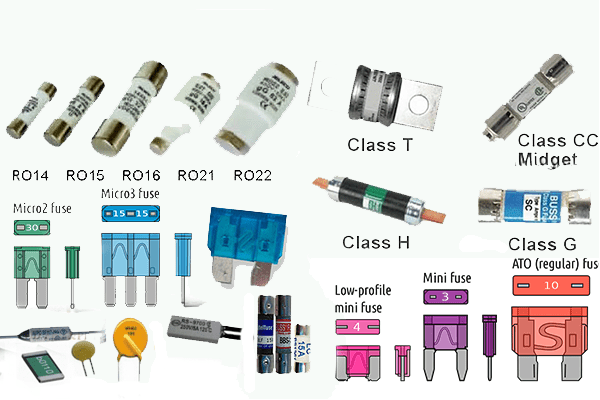
The idea of the work of the electric fuse, The idea that an electric fuse works depends on the amount and type of current passing through it to and from electrical and electronic circuits.
What is the idea of the electric fuse and its importance in electrical and electronic circuits.
Definition of electric fuse
Known as the electric fuse electric fuse) as an electrical component that connects or is connected with electrical devices with the aim of protecting against any malfunction that may occur in the circuit,
Like: Short circuit, overturning of the DC poles, or higher value of the current than the value that the fuse is designed for.
The electric fuse comes in different types, shapes and capacities, but it serves one purpose, which is the melting of the wire when exposed to a high current.
What are the components of an electric fuse?
Electric fuses are designed in several forms, and the most popular types widely spread are in the form of a cylindrical bottle, with two metal bases on its ends, in addition to the fusion wire inside the fuse bottle, as shown in the following figure:
Electrical fuse components
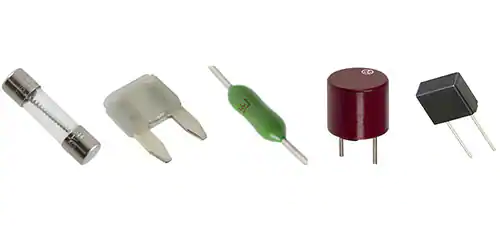 The importance of electric fuse
The importance of electric fuse
The presence of an electric fuse in electrical circuits has an important role in protecting all components of the circuit from any noticeable rise in the intensity of the current passing through it.
Where the electric fuse is connected in series with the circuit to be protected from possible electrical faults.
The location of the electrical fuse wire
The idea of the work of the electric fuse
The idea of \u200b\u200bthe electric fuse is based on the fact that when an electric current of a value higher than the value of the designed fuse current is passed,
The wire inside the fuse bottle will melt as a result of the heating effect of the current, which leads to cutting the fusion wire and thus prevents the flow of electric current to the rest of the circuit components.
The idea of the work of the electric fuse
Causes of electrical fuse damage
Fuse damage can be caused by the following reasons:
- The passage of a current higher than the value of the fuse current for which it is designed.
- As a result of the contact of the two ends of the alternating current source or the occurrence of a short circuit within an electrical circuit.
- Reverse the polarity of direct current (DC) by flipping the positive and negative terminals, Since there are sensitive electronic boards that cannot tolerate reversal of polarity,
- Such as the panel of the air conditioner and some types of chargers that do not have the anti-polarity protection system.
Advantages and disadvantages of electric fuse
Advantages:
- small size.
- Cheap.
- Easy to install.
- It is available in different capacities and types.
- No maintenance required.
- Fast fusion compared to electric circuit breakers.
- It has a dedicated DC type to protect the battery.
Negatives:
- It is used only once before melting. So it must be replaced when it melts.
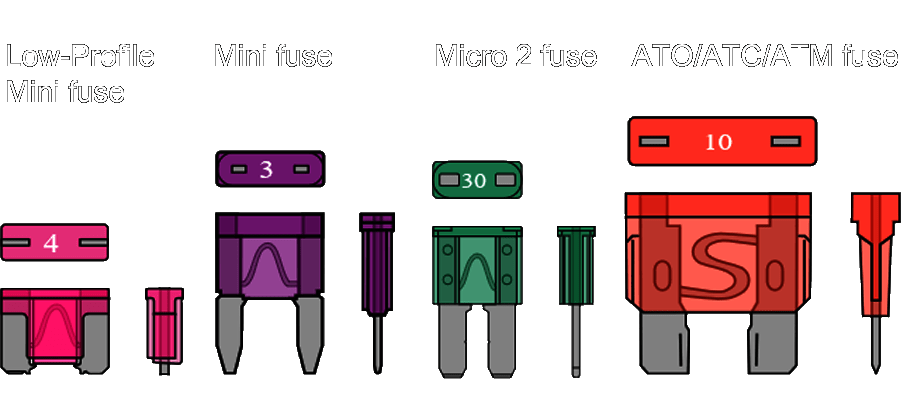 Fuse check steps
Fuse check steps
Fuse check steps
Fuse check steps Sometimes you may need to check some parts in order to test them
Troubleshooting and troubleshooting with the multifunction meter.
These are the tests you may want to pass, as a measure Voltage , resistance and current , you need a multimeter .
Therefore, if you want to check the battery or the fuse, the device for measuring and checking must be present.
Let’s get acquainted with the steps of checking the fuse step by step to make it simple for everyone to apply the steps in practice.
What is an electric fuse?
electric fuse Fuse) is a protection element whose function is to protect electrical appliances from malfunction or permanent damage.
The purpose of its presence in the device is to disconnect the electrical source current from the device in case it is exposed to a short circuit or a sudden surge of current.
The fuse is called in Arabic: fuse or fuser.
Therefore, it has become necessary to acquire the skill of the electrical fuse test,
Where it is checked by adjusting the multimeter to the position of the resistance and there are many steps that we will remember you in this article step by step.
electric fuse
Electric fuse terminals
In the simplest form, an electric fuse consists of a wire made of a thickness appropriate to the ampere value it is designed for.
and two terminals to pass the current through,
The fuse must be chosen so that its current is higher than the current of the device or the load to be protected by a small percentage in the range of 10% to 20%, according to what is available in the market.
Fuse check steps
There are several steps to check the fuse that must be followed:
- Placing the multimeter in a suitable place. Set it to the resistance check position using the indicator knob.
- Place the cursor switch on the lowest resistance band (200 ohms), And if the device is of the automatic type, put on the resistance symbol only.
- Put the fuse to be tested on an insulating object such as wood, for example. In order to avoid touching his limbs together.
- Place the two ends of the multimeter probes parallel to the two ends of the fuse, without depending on the polarity, As shown in the picture.
- There are two possibilities upon examination: The fuse is intact if a very small resistance value reading appears, and the reading may be close to zero. But if the resistance value is too high (infinity) then the fuse is damaged.
Required tools (fuse with multimeter)
How to check the fuse using a multimeter
These steps that were mentioned in the steps for checking the fuse apply to all fuses, When you notice a damaged fuse, you must immediately replace it with a new one.
How to check fuse step by step
In the event that you wish to test any fuse while it is connected to a circuit, Be sure to turn off the power supply before testing, To avoid an electrical short.

DC fuses
DC fuses are used in many electronic circuits, the most important of which is to protect all types of electric batteries, especially the car battery . What are the DC fuses and their capacities, in addition to their role in protecting DC circuit systems.
What are DC fuses?
It is called by several other names such as: DC fuses, battery fuses, or Bosch Fuse).
DC fuses protect all DC circuits.
Such as: solar energy systems and car battery,
DC fuses are available in the market with various amperage capacities and voltages that are selected according to the current and voltage of the load to be protected.
Various ampere capacities of DC fuses
DC fuse function
The function of these fuses is to protect the DC systems from short circuits, polarity changes, or the current value exceeding the permissible limit in the circuit.
The protection process is carried out when more than the required electric current is passed through the fuse as a result of a malfunction.
This leads to damage or melting of the fuse and thus prevents the current from passing into the electrical or electronic circuit.
Connecting a DC fuse in the circuit
The DC fuses in the circuit are connected in series with the power source, for example, the battery.
In the case of series, we know that the current is indivisible, and therefore we guarantee the passage of the entire load current through the fuse, as shown in the following electrical circuit:
How to connect a DC fuse inside the circuit
What is the difference between DC and AC fuse
The theory of operation of all types of fuses and their components is the same, but they differ in the method of design.
Whereas, DC fuses are larger in size, thickness and wire distance than AC fuses of the same power.
The reason for this difference is the appearance of the electric arc resulting from constant DC current values.
Therefore, when the value of the DC current increases significantly, it causes a severe electric arc that can cause fires.
Conversely with alternating current, The electric arc does not occur significantly in AC circuits because it is variable in value.
Thus, electric arc formation is not allowed.
DC fuse uses
DC fuses are used to protect electrical systems that operate on DC, including all cars, mechanisms, DC loads, solar panels, inverters, and all types of electric batteries.
Most devices that contain electronic boards are sensitive.
SMD fuses for short (Surface Mount Device) are also used specifically to protect laptops, cameras, and mobile phones internally, installed by manufacturers to protect certain functions.
electric fuse
Solar fuses
Solar fuses
Solar fuses, The fuse, in its simple general form, is a protection tool that separates the electrical circuit when the value of the current exceeds the value of the fuse current designed on it.
It can be said that it is important in the solar energy system Especially to protect between: (panels and batteries), and between Integrated solar inverter.
The difference between it and circuit breakers is that the fuse is faster in responding to the separation,
But it must be replaced after melting,
While the DC circuit breaker does not respond very quickly and is not sensitive to slight overcurrent, But it can be connected again after the bug is resolved without change.
DC fuses
First you should know that there are two types of fuses in terms of the type of current,
A type dedicated to alternating current and a type dedicated to direct current , and each of the two types has its protection areas, meaning there are fuses that bear the take-off current,
Others disconnect immediately as soon as a double surge of current is felt at any moment.
Hence, we must pay attention to the type of fuse, and it is preferable to put the appropriate fuse in the appropriate place for the purpose of more accurate protection,
That is, if you want to install fuses to protect the components of the solar system , you must purchase PV solar fuses.
Solar fuse components
Solar fuses consist of two terminals and a connection base known as the holder or fuse, Dedicated to put the fuse inside. Fuse has no polarity (ie positive and negative electrodes).
Fuse holder and fuse
Choosing the necessary solar fuses
The fuse is chosen based on two things: voltage and current.
The fuse voltage should be at least 30% higher than the total voltage of the panels in series according to the recommendations (Volume 6 of IEC 60269-6) and UL 248-19 for the protection of photovoltaic units.
The rated fuse current must be the same value as the maximum fuse current written on the data plate of one of the solar panels if connected in series,
Which forms a continuous string according to the recommendations as well.
But in the case of installing a protection fuse for the composite connection of the solar panels (series/parallel) which is called the array,
The fuse current must be chosen so that its value is twice the value of the maximum fuse current for one panel.
That is, if the value of the maximum fuse current written on the solar panel data card is 15A,
The fuse to be installed is 15A in the case of series connection, But in the case of the composite (array) connection, the fuse current must be chosen according to the sum of the conducting arrays.
Solar fuses
Connecting solar fuses
Connect the fuse in series to any load, solar panel or battery, where placed between Solar panels and the charging regulator , also placed between the batteries and the inverter, as well as with the charging regulator.
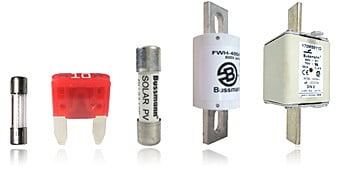
How to protect household electrical appliances
How to protect household electrical appliances
How to protect household electrical appliances, Protecting electrical appliances is of the utmost importance that every home with an electricity subscription should have.
In order to preserve household electrical appliances, additional protection devices must be installed for sensitive devices whose efficiency is reduced as a result of weak electricity or high voltage of the supplying source.
Follow us to find out how to protect household electrical appliances and what protections we need.
The importance of protecting electrical appliances
Everyone seeks to protect household electrical appliances from any problems in the electrical wiring network, as well as from high and low voltage, especially sensitive devices such as computers and electric refrigerators.
The goal of protection is to reduce maintenance costs for electrical appliances, as well as to stabilize the source of the electricity voltage and the safety of the home wiring network.
How to protect household electrical appliances
There are important protections that it is preferable to have in order to protect household electrical appliances from any possible malfunction of the electricity network, whether from within the extensions or from the main line connecting to the house,
The most important protections are:
- High and low voltage protection device.
- Electric fuse.
- Uninterruptible power supply (UPS) device.
High and low voltage protection device
It is a device designed to protect electrical devices from low or high voltages of the electricity source.
This is an indispensable device because it protects us all the devices that run in the house, Like: Refrigerator, computers and chargers.
Important note: The protection device cannot be connected directly with household electrical appliances, but there is an intermediary, which is Contactor or relay according to the current of the total devices.
High and low voltage protection device
 electric fuse
electric fuse
It is also an important protective element, You may notice it installed inside the chargers and next to the refrigerator motor and home washing machine.
Its function is to disconnect the current from the electrical device when the value of the current is higher than the current to separate the fuse.
And the fuse current is selected at a value slightly higher than the current of the electrical device.
Battery and electrical protection fuses
Conclusion:
A fuse is an electrical device that cuts off the flow of current in an electrical circuit. It is installed in a circuit to stop the flow of excessive current.
A fuse is usually a short piece of wire.
The fuse is made of a material with high resistance and low melting point,
So that it melts due to the high temperature of the wire during the flow of high current.
The thickness of the fuse wire is determined based on the amount of current flowing in an electrical circuit.
An alloy of tin and lead is usually used as a fuse wire,
It has high resistance and low melting point (Picture will be uploaded soon) The resistance of the fuse wire is greater than that of the live wire
, The diagram represents a basic electrician (image will be uploaded soon) The function of the fuse Below is a list of some of the main functions of the electrofusion.
The electric fuse acts as a barrier between the electric circuit and the human body,
It prevents any damage to the electrical device by limiting it. Current overflow prevents current overload.
When too many devices are connected in one circuit,
This increases the load which requires a fuse to terminate the circuit connection, It prevents damage caused by mismatched loads.
Prevents power outages: In the event of any malfunction in the circuit components.
, the nearest circuit is generally marked on the fuse Information about ampere rating, rated voltage, approval standards for the fuse, and interrupting rating.
This information must be checked and verified before purchasing a fuse. The operation of electric valves is based on the principle of the heating effect of electric current.
It is made of a thin metal wire of a non-combustible material.
The fuse is always connected between the terminals of the device in series with the circuit.
(Picture will be uploaded soon) When excessive current flows in the circuit,
It generates heat in the circuit which causes the fuse to melt due to its low melting point, It also opens the circuit.
An overflow of current may cause the circuit to break down and stop the current flowing.
Once the fuse melts, It can be changed or replaced with a new fuse, The smelter is usually composed of elements such as zinc, copper, aluminum and silver,
The fuse acts as a circuit breaker and cuts the circuit in the event of any failure. Circle.
It serves as a protector for electrical appliances and also as a safety measure for humans.
The figure below represents the fuse process, fuse barrel and fuse connection Characteristics of fuse wire Below are some important characteristics of fuse wire Current rating:
It is defined as the continuous conduction of the maximum current held by the fuse without fusing.
It is the amplitude of the current, It is measured in amperes. Current (Sin) = 75% Current (Rated) Rated Voltage:
If the voltage is connected in series with the fuse, It does not increase the voltage rating.
The energy carried by the fuse element in the event of a short circuit. It measures the thermal energy of the fuse, It is generated when the fuse blows.
Capacity< short circuit current,
Voltage drop: The fuse element melts whenever there is excessive current in the circuit. The circuit opens.
as a result , Reduces voltage drop and temperature resistance change: The fuse melts when the operating temperature is higher and the current rating is lower,
The graph represents the temperature versus the current carrying capacity of the fuse.
The current carrying capacity of the fuse is 100% when the temperature is 25°C (three lines meet at this point).
Thereafter the current carrying capacity is reduced by up to 82% at 65°C. This indicates that an increase in temperature reduces the current carrying capacity of the fuse.
uninterruptible power supply (UPS) device
It is a device designed to protect devices that suffer from frequent power outages.
Like: PC, The UPS contains a battery backup that supplies the power needed to keep your computer running uninterrupted permanently.
There is a device designed to protect electrical devices from high and low voltage, as well as protection from high current, and it can be programmed according to what you want,
It is also possible to adjust the amount of start delay.
uninterruptible power supply (UPS) device
Why use UPS?
- Does not require fuel
- It does not come out of any exhaust or gases
- Safe as it does not contain rotating parts
- It works quickly after a power outage (i.e. it does not need to wait for it to work as in a generator)
electric fuse
What is the UPS device:
The UPS unit is a power supply unit in the absence of electric current, protecting and regulating electricity according to the electrical standards necessary for the operation of electronic and medical devices, computers, networks, communication devices, printing devices, and industrial devices when the power supply is tampered or interrupted.
UPS components:
The UPS consists of a winding, a voltage regulator rectifier, batteries, a battery charger, and an electronic control circuit equipped with a processor (CPU). There is also a system that filters the electricity, that is, purifies it to complete the required output voltage.
electric fuse
Types of UPS units:
Offline (Standby) UPS units:
When a power failure occurs, the UPS switches to a power supply from its own battery. When the main feed returns, this unit replaces the supply again.
This switch between the two sources must not exceed four milliseconds, which is the maximum for the continuation of the work of most power units inside the computers, Power Supply Units, or they will stop working.
In fact, anyone can calculate the time required to switch a UPS unit by looking at the specifications of the computer feeder.
Some UPS units rely on a combination of semiconductor and iron,
To form a core in which electrical energy is stored until the process of switching between the main alternating current line and the internal battery is completed.
the use : Protection of computers and peripherals.
They provide us with electrical current that is free of residues of electricity and turns to supply us with current from the batteries during blackouts and lows Line Interactive UPS units:
These units maintain the idea that the AC line is the primary power supply and switches to battery backup when the main power is cut off.
However, the main advantage here is the presence of special circuits to clean and smooth this energy from the problems we mentioned earlier, which is called Automatic Voltage Regulation (AVR).
. It thus gives greater protection to the electronic equipment connected to it and is used to protect terminals, servers, communication devices and Internet servers.
Provides us with electric current free from the remains of electric current,
It provides us with current from the batteries during a power outage, but during a low current it regulates this voltage to the normal limits without resorting to the energy stored in the batteries Online UPS units:
Sometimes called True UPS, true UPS.
They are the best kind that can be bought.
Where the battery is the main source of electrical energy,
In contrast to the previous two types,
in which the battery is the secondary source of electrical energy.
The big advantage of these units is, in which the power comes from the battery, There are two types of conversion
: the first from alternating current to direct current, to constantly charge the battery,
Then the second conversion from direct current to alternating current output to electronic devices,
These two conversions ensure a complete cleaning of the electrical energy,
In addition to not having any additional time necessary after the main power outage,
As in the previous two types of UPS units.
And as usual,
With higher work efficiency we expect the price of this type of UPS to rise.
Then it consumes more electrical energy, suffering from high temperature,
Therefore, they are used in critical functions of the work of electronic devices.
There has been a development on this type of unit and it is called as it reduces electrical energy consumption. the use : Protection of electrical devices and delicate and sensitive servers. .
electric fuse
Conclusion:
Electrical protections are of the utmost necessities that should not be ignored in order to protect household electrical appliances from any problems that may occur in electrical wiring as a result of wrong connection.
Or the occurrence of a sudden rise in the voltage of the source as a result of a malfunction or the occurrence of a short circuit in the household electrical connections.
electric fuse
We are pleased to have you visit our pages on social networking sites, where we publish exclusive offers on our website.
Our Facebook page here .
Our Twitter account is here .







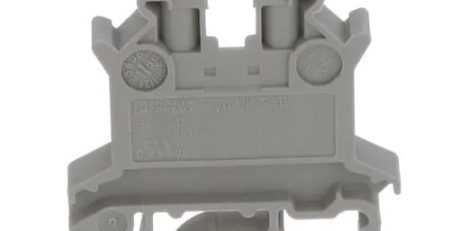



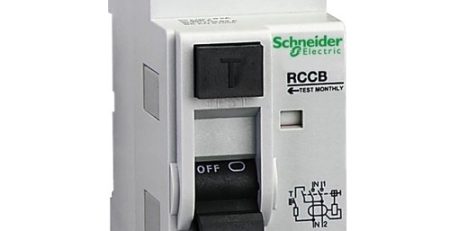


Leave a Reply
You must be logged in to post a comment.